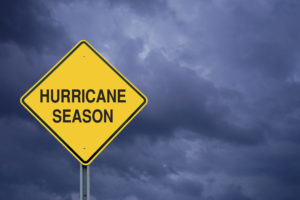How can families prepare for hurricane season?

Written by Dr. Leslie Taylor
It’s the end of the school year and many children and families are ready for days at the swimming pool, having cookouts or planning for vacation. Summer also marks the beginning of hurricane season, with heavy spring rains as common reminders of Hurricanes Harvey, Maria, Florence, or Michael. Children may have questions about thunderstorms, flooding, or what will happen if there’s a hurricane. Whether these questions are an indication of curiosity or potential nervousness about inclement weather, it’s important for parents to provide answer calm and thoughtful answers. Children’s concerns about disaster are not always fully appreciated by adults. It’s important for parents to ask children questions and gain understanding of their children’s knowledge and perspective of hurricanes, provide them developmentally appropriate information about how to prepare, and for parents to know and anticipate what their children will need from them during these events.
There are meaningful benefits to including children in family disaster preparation activities. Children’s involvement in collaborative decision making activities also supports cognitive and social development[1]. Parents can involve their children in the development of hurricane communication plans for keeping in touch with extended family members, friends, and neighbors. In addition, children can help with the of build hurricane preparation kits that include card games, transitional objects (i.e., comforting toys or blankets), or maps. The Federal Emergency Management Agency[2] has several child friendly activities and games that focus on hurricane readiness and preparation to help parents have these discussions with their children, and the American Red Cross[3] has developed an app that simulates disaster related practice activities for children and youth ages seven and up. The website also includes information about how hurricanes form and can help further reiterate to younger children that hurricanes are natural events and not related to anything they, or anyone else has done.
[1] For review, see Pfefferbaum, B., Pfefferbaum, R.L., & Van Horn, R.L. (2018) Involving children in disaster risk reduction: the importance of participation. European Journal of Psychotraumatology, 9, 1-6.
[2] https://www.ready.gov/kids
[3] https://www.redcross.org/get-help/how-to-prepare-for-emergencies/disaster-safety-for-children.html
Leslie K. Taylor, PhD, is an assistant professor in Department of Psychiatry and Behavioral Sciences. She serves as the clinical director of Child Services for the Trauma and Resilience Center. A licensed psychologist, Taylor has experience working closely with children and families. She has also conducted research on the impacts of childhood trauma relative to the phenomenology of post-traumatic stress symptoms, and other emotional and behavioral conditions that occur in their aftermath.